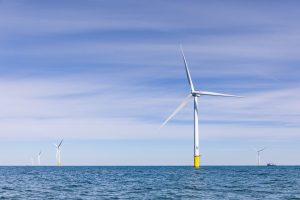Maryland Gov. Wes Moore (D) recently signed legislation that will facilitate evaluation and approval of revised offshore wind projects into law.

Offshore wind turbine
Courtesy file photo
By Bethany Hooper, Associate Editor
Legislation facilitating the evaluation and approval of revised offshore wind projects was recently signed into law.
On May 9, Gov. Wes Moore (D), joined by Speaker of the House Adrienne Jones, Senate President Bill Ferguson and US Wind representatives, signed legislation that allows qualified offshore wind developers to apply for outstanding Offshore Renewable Energy Credits (ORECs) created as a result of changes in the market and to add additional capacity to existing projects, among other things. While local officials argue the legislation would provide funding to support projects off Ocean City’s coastline, others say it keeps the state’s offshore wind goals on track.
“Revisions outlined in House Bill 1296 seeks to streamline the approval process for revised project schedules and pricing, ensure the project is located in the authorized wind energy area, and those possessing offshore wind renewable energy credits can move forward expeditiously,” House Economic Matters Committee Chair CT Wilson, bill sponsor, said in a hearing this spring. “Moreover, the bill does not restart the process for the projects. Merely, it allows limited alterations to already approved plans, including the adjustment to turbine placement, generating capacity, installation dates and pricing within the existing statutory limits.”
Earlier this year, Danish company Ørsted announced plans to reposition its Skipjack Wind project, which was set to bring a 966-megawatt project off the Delmarva coastline. To that end, legislation – cross-filed as House Bill 1296 and Senate Bill 1161 – was introduced in the General Assembly to require the Maryland Public Service Commission to open a revised round-two proceeding to evaluate certain offshore projects and authorize certain offshore wind projects to submit certain revised plans for project schedules, sizes and pricing, among other things.
“We lost half of the power because Ørsted stepped out,” Wilson said. “US Wind will hopefully bring at least a third of what Ørsted has left … It’s about being able to capture some of what has been lost.”
The legislation has been opposed by both county and resort leaders, who came before the General Assembly in February to share their concerns about turbine sizes and project subsidies.
“HB 1296 as proposed gives US Wind the funding in the form of more expensive subsidies from Maryland ratepayers,” Ocean City Councilman Tony DeLuca said at the time. “So, unlike most energy projects, where the larger the project the lower the energy cost, under HB 1296 the project gets bigger and the price goes up.”
However, those supporting the legislation say it will allow offshore wind developers to overcome economic challenges and meet scheduling and pricing requirements set by state law. For developer US Wind, the legislation would assist the company in altering its Maryland offshore wind project, according to CEO Jeff Grybowski.
“This legislation is a game-changer for the Maryland offshore wind program,” he said in a statement last week. “We are grateful for the unwavering support and stalwart leadership of Maryland’s leaders on this critical piece of legislation. US Wind is here to stay. I am very confident that we will build Maryland’s first offshore wind farm, first offshore wind manufacturing facility at Sparrows Point, and deliver this clean energy to the people of Delmarva for years to come.”
In addition to allowing qualified developers to apply for outstanding ORECs and add additional capacity to existing projects, the new law amends the POWER Act to add an additional solicitation to the state’s Department of General Services offshore wind procurement schedule and removes the cap on the amount of offshore wind energy the state seeks to procure.
